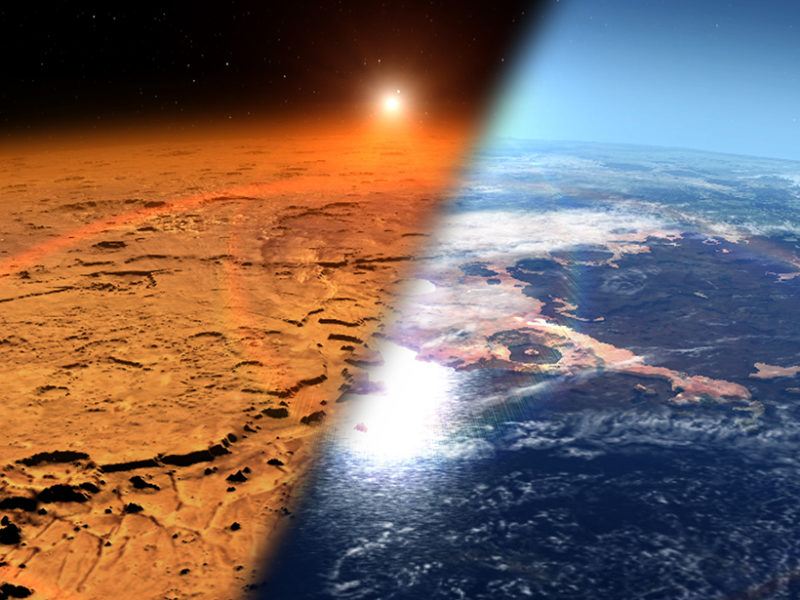Mars’s magnetic field weakened and disappeared billions of years ago. Now, scientists have found that the weak field might have been worse than none at all.

NASA GSFC
Early Mars boasted an Earth-like magnetic field that shielded it from solar radiation and helped the planet hold onto its atmosphere. But as the Martian crust cooled, its magnetic field weakened. Now, new research reveals that this scrawny magnetic field may have been worse than no field at all.
How the planetary magnetic field helped Mars hold onto its atmosphere has been a longstanding question, and one that’s difficult to study today. The Sun was brighter in the solar system’s early years, dousing the planets with stronger radiation than today. Mars also produced a stronger magnetic field back then than the patchwork quilt it’s left with now. To study the escaping atmosphere under conditions drastically different from today, scientists turned to simulations.
"The relative effects have been controversial," says Kanako Seki (University of Tokyo), coauthor of the study published in the Journal of Geophysical Research: Space Physics. A global magnetic field can serve as both a blessing and a curse. It should act as a shield, blocking most interactions between a planet’s atmosphere and solar radiation. But some studies have shown that weak magnetic fields actually increase the loss of charged particles.
With simulations, Seki, study lead Ryoya Sakata (also at University of Tokyo), and their colleagues show that a planet with a weak magnetic field would lose ionized oxygen and carbon dioxide from its atmosphere 100 times faster than one with a strong field — and six times faster than a planet with no magnetic protection at all.
Weak Fields, Thin Air
Mars’s magnetic field was active in its youth, pushing back against the solar wind pressure created by charged particles streaming from the Sun. But as the field weakened, its pressure decreased, giving the solar wind easier access to the atmosphere.
The magnetized wind snaps the lines of the planet’s magnetic field, blowing them backward in the northern dusk or southern dawn regions. The dents in the magnetic field at these locations, called cusps, are the points of escape, where the magnetic field lines recently snapped or merged. "In cusps, the solar wind can easily penetrate and planetary ionized atmosphere can escape along the open field lines," Seki says. "The formation of the cusp can increase the atmospheric escape."
According to the simulations, the cusps become more prominent in the case of a weak magnetic field. Then, when the magnetic field fades altogether, there are no cusps at all, slowing the escape of charged hydrogen and oxygen.
Catherine Johnson (Planetary Science Institute), who was not involved in the study, points out that, according to the new research the transition between protecting the atmosphere and aiding escape occurs when the magnetic field is about 10 times weaker than present-day Earth's field. "Most studies of Mars's field have concluded that the ancient field was at least as strong as Earth’s," Johnson says.
However, the new study focuses only on how a magnetic field interacts with the charged part of the atmosphere, and previous studies have concluded that ion escape contributes only a minor role in removing the atmosphere today. Its role in the past, when the Sun burned stronger and brighter, is still debated.
"At least part of the disagreement comes from uncertainty over what both the atmosphere and the Sun were like in early solar system history," says David Brain (University of Colorado, Boulder), a member of the MAVEN mission. "Which processes dominated is uncertain."
Nevertheless, the researchers argue that the increase in the amount of atmosphere that escapes from a weak magnetic field compared to a strong one is significant enough to make a difference. "Two orders of magnitude variation in ion loss rates has a critical impact on atmospheric escape,” they write.
From Mars to Exoplanets
According Brain, the new simulations address two important issues at once: how much atmosphere escaped from ancient Mars and how the magnetic field influences that escape rate. While previous studies have touched on these concerns individually, none have addressed them in combination.
"This is the first [theoretical study] that addresses both questions simultaneously, and therefore provides an important benchmark for comparison with future studies," Brain says.
Understanding the role of the Martian magnetic field affects our understanding of exoplanet habitability as well. While Mars is small enough and has low enough gravity that other processes may dominate the process of atmospheric loss, Brain says that for larger, Earth-size worlds, "ion escape is the only game in town."
"The work presented here is important in a larger sense,” Brain says, “because it hints at the importance of magnetic fields for all planets—including ones where ion escape is the only viable escape process.”
 2
2









Comments
Tron1002
May 7, 2020 at 6:46 pm
Thank you for this article. I've been fascinated lately on the binding forces of our universe and ion magnification certainly helps.
You must be logged in to post a comment.
Anthony Barreiro
May 9, 2020 at 5:24 pm
Unfortunately Sakata et al.'s article is behind a paywall. The link in this article only provides the abstract, a "plain language summary" (neat idea), and a further link to a "research spotlight" further describing the study for the general reader.
I searched for an image of Mars' magnetic field and found these very helpful lecture notes from Peter Gallagher at Trinity College Dublin. Clear illustrations and descriptions of the magnetic fields of every planet in our solar system, with the underlying mathematical equations.
https://www.tcd.ie/Physics/people/Peter.Gallagher/lectures/PY4A03/pdfs/PY4A03_lecture14n15_magnetospheres.ppt.pdf
You must be logged in to post a comment.
You must be logged in to post a comment.